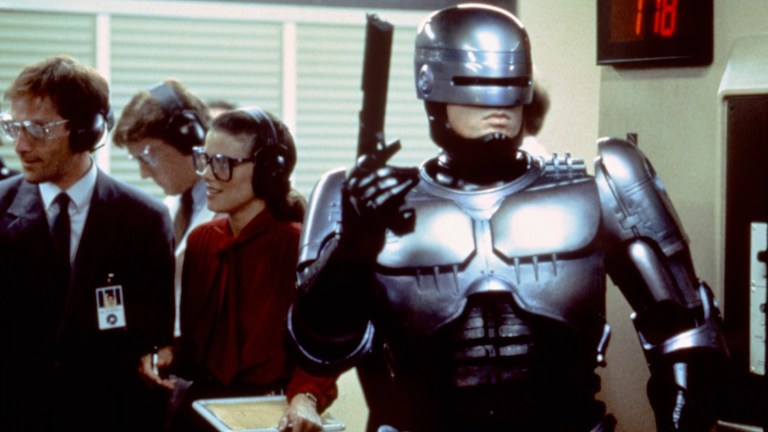RoboCop Is Secretly Paul Verhoeven’s Movie About Jesus
Paul Verhoeven still wants to make a movie about Jesus Christ one day, but he already did with the sneaky and satirical metaphor he planted in RoboCop.

RoboCop became both a blockbuster and a controversial critical darling upon its release in 1987 due to a mix of jet black humor and as subtle as a jackhammer social commentary sticking a perfect landing. Its success was a surprise to an industry that had looked at Edward Neumeier and Michael Miner’s original script with its simplistic one-word comic book title and assumed it was fated to be a high-concept stinker.
The 2023 RoboDoc documentary miniseries does a terrific job of chronicling the effort it took to turn RoboCop into both a box office win and an enduring cult masterpiece with a quick and funny format that makes it accessible to modern fans. The truly hardcore might not learn many new details from the four-hour presentation, available on Tubi, but one thing the documentary does do, especially after the Catholic satire of Benedetta, is make it clear how much of RoboCop‘s sly intelligence relies on director Paul Verhoeven’s peculiar obsession with religion—specifically Christian imagery.
Verhoeven’s Religious Obsession
Born in Amsterdam and raised in The Hague during the height of its Nazi occupation, Verhoeven was exposed to death and gore from an early age. RoboDoc gives Verhoeven another chance to discuss the atrocities he personally witnessed, from which it’s easy to extrapolate his fascination with heavy violence as a human way to absorb and, well, transubstantiate horror into humor. Sometimes he does this blatantly and sometimes with a subtlety that is missed by critics and fans.
Even his earliest pre-Hollywood films reveal a fascination with the themes and symbols of faith. His feelings toward that iconography can vary, with early efforts occasionally taking them on at face value, and others attacking their orthodoxy with a near heretical frustration. 1980’s Spetters is an interesting example of Verhoeven’s pre-RoboCop vision. It’s a lesser known flick about the lurid lives of poor, working class dirt bike racers, where the violence and glory inherent to the sport is their chance to escape, or ascend, their blue collar existence.
Spetters also hides a solid argument that toys with power dynamics in a way usually seen in Christian morality plays, to the point that all three young, male racers share a sexy food vendor (a Mary Magdalene, if you will) as a potential prize. But it’s 1985’s Flesh & Blood that the documentary highlights for a quick and simple-to-digest visual on how Verhoeven can’t resist playing with the imagery of religion. Flesh + Blood is a movie you might watch by mistake while looking for something to hit that Ladyhawke itch. It stars Rutger Hauer, as many of Verhoeven’s films once did, and it takes place at the end of the Medieval era, a fact which offers additional commentary on the film’s rather blatant and heavily cynical themes.
Existing about a million miles from the chivalrous Ridley Scott fantasy released the same year, Flesh + Blood is a deconstruction of the idealized imagery often associated with the Middle Ages, killing honor and romance deader than The Last Duel with the help of the sheer devastation of struggling through the Black Plague. That’s the backdrop to an already embittered story about men tossed aside by the ruling class who then toss their oaths and strike back in brutal revenge.
But it’s a striking scene of Rutger Hauer, the chief fallen angel of this once-loyal cadre, haloed by a flaming wheel that sticks in the brain. It’s a gag on the cherubim; framing Hauer with an Ophanim, a heavenly flaming wheel similar to Ezekiel’s biblical vision, and it’s the sort of sacreligious joke you’ll find in the majority of Verhoeven’s work. And yes, that includes RoboCop.
The Trials of RoboCop
Like many creatives approached with the RoboCop script, Verhoeven wasn’t impressed by the concept. Then his wife gave it a quick read and pointed out the potential for sheer gobs and blobs of bloody violence. That got Verhoeven’s attention, and what’s more, he quickly saw the potential for an underlying story about a man deified against his will while still in search of the human soul still inside of him. Under Verhoeven, Murphy’s (Peter Weller) ultraviolent execution comes to intentionally resemble a crucifixion, with Clarence Boddicker (Kurtwood Smith) shooting him through the wrist. Scholars and collectors of gruesome trivia know that’s where you actually would be nailed through for that torturous death.
Murphy’s resurrection is also both sacred and profane, with his two partners at his side. Ellen, his wife and the mother of his child, walks with him through life like Mother Mary, while Anne Lewis guides him through death with the same earthy consideration of the Magdalene.
Verhoeven goes so far as to cut away bits of the original script to ensure the thematic line of death-rebirth-regained humanity is as clear as possible. A sequence where RoboCop goes to Alex Murphy’s grave never made it past the early stages of development, as Verhoeven realized that, spiritually, that scene would be irrelevant. Murphy isn’t there—he’s hellbound inside this metal shell, looking for a second coming he cannot have.
Even Officer Alex Murphy’s last temptation is similar to Jesus Christ’s. It’s literally the same offer of restored humanity when Murphy, in the finale, reclaims who he is. Since he’s not actually the Son of God, Murphy gets to keep his renewed sense of self. Until the next movie when OCP’s legal department tries to beat it out of him.
Walking on Water
It’s easy to point at the climactic scene where RoboCop walks on water and laugh about the religious parallels. But the entire movie was deliberately crafted around that sight gag, from the previously mentioned crucifixion to RoboCop’s larger-than-life presence when tangling with his first few perps. The alley assault features one of the movie’s most striking shots where RoboCop’s massive shadow envelops two attempted rapists and their victim, growing even larger and more intimidating as he approaches. It’s so arresting that, as the RoboDoc documentary points out, the audience never notices that’s the reverse of how shadows work, and it helps create an inhuman mystique around the resurrected cyborg. We can also mutter something about the long shadow of Christianity during the Crusades here, and maybe that’s going too far with the parallels and Verhoeven’s jaded notion of faith… but maybe it isn’t.
To help Verhoeven’s thematic emphasis, RoboDoc makes it clear he was hands-on throughout much of the creative process—sometimes to the annoyance of the crew. According to one anecdote late in the documentary, Verhoeven’s obsessive antics ruined an entire day’s worth of heavy makeup when filming RoboCop’s helmet-less scenes with Officer Lewis (Nancy Allen) in the steel factory. But he’s also the one who insisted that the audience wouldn’t see Murphy’s human face again until he was on the cusp of remembering who he was. That even includes the softening of RoboCop’s modulated voice, until Weller’s rich, all-too-human tone returns to the foreground.
Yet Verhoeven’s conflicted ideas of faith still paint Murphy’s return with an equally human cynicism. Murphy has revived, but his memories remain lost. He’s a breathing ghost with a fragile tether to his humanity trapped in an inhuman shell, and it’s easy to suspect that, theologically, he no longer has all of his soul. It’s a kind of holy blasphemy, offering a backhanded resurrection to what had once been a good man. And that’s a Verhoeven speciality.
RoboCop of Nazareth
Paul Verhoeven is an amateur secular scholar of Christianity, and his particular interest is in the concept of Jesus as a charismatic human being after all of the supernatural trappings are stripped away. He’s written a book on the topic, , Jesus of Nazareth, released in 2007, and he’s been attempting to film those ideas since 2011. Besides the fact that this is a film that undoubtedly would go down as smoothly with the various fanatic and right wing ‘concern’ groups as smoothly as Martin Scorsese’s (still reverent) The Last Temptation of Christ did, it’s also hard to ignore that Verhoeven’s controversial but deeply thought discussions on faith haven been consistently present in most of his movies since his breakout film Turkish Delight (1973).
Turkish Delight is a monument to Verhoeven’s earthy ideas of sacrilege and sin in order to achieve a kind of immortality. Meanwhile 2021’s Benedetta drags us into a lurid but poignant discussion of sexuality as sacred, even in the face of profane tragedy. But sandwiched between these cinematic bookends, it’s RoboCop, a comic book styled movie with enough gore to pick a fight with the MPAA, but which is nonetheless Verhoeven’s intentional and funny Jesus movie.
It’s possible that it’s this realization that keeps Jesus of Nazareth on the shelf as a film while Verhoeven is instead eying a reunion with RoboCop and Starship Troopers writer Neumeier for a movie called Young Sinner. That’s certainly not a load-bearing title for someone like Verhoeven.
Legacy of Cain
RoboCop is a lightning-in-a-bottle film, a story whose multiple facets never survive in sequels or remakes, much less the ill-advised television series. Or cartoon. Or the other cartoon, which somehow sucked even more than the first one. Only RoboCop 2 gives it a good college try, with the remnants of a Frank Miller script adding a little oomph to an inspired Tom Noonan performance as Cain. Here are the bones of a good Jesus vs. Antichrist hands-on brawl, a goofball kind of Wrestlemania offered up as visual catechism. It doesn’t go all the way, faltering in favor of safer action and commentary, but the result continues to entertain while the 2014 remake goes nigh-forgotten.
Even RoboCop: Rogue City, a fantastic game put together by loving fans that features one more ride with Weller as RoboCop, puts aside faith in favor of its bang-on social commentary. No one else can have this kind of highbrow conversation while slinging around delightful, lowbrow muck, and perhaps it’s wise that few try. What Verhoeven made stands alone; a weird, ageless film that talks about humanity’s troubles with the same depth and cheek as The Seventh Seal, but with a lot more bullets to somebody’s dick.
You know what? Maybe Our RoboCop Remake is the only piece of RoboCop media to actually draw close to Verhoeven’s vision, by virtue of its own bloody hilarious sacrilege. Call it RoboCop’s own Book of Eunuch. Or don’t, because it’s a terrible pun. Excuse me, there’s an ED-209 at the door and it sounds pis–
